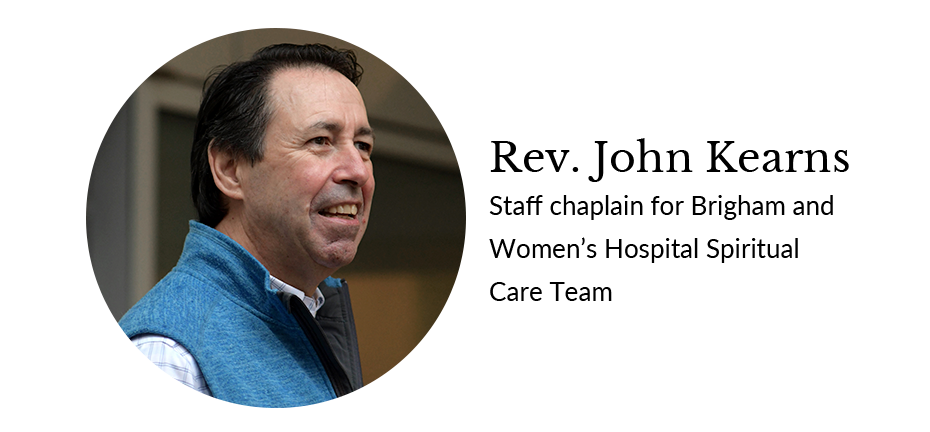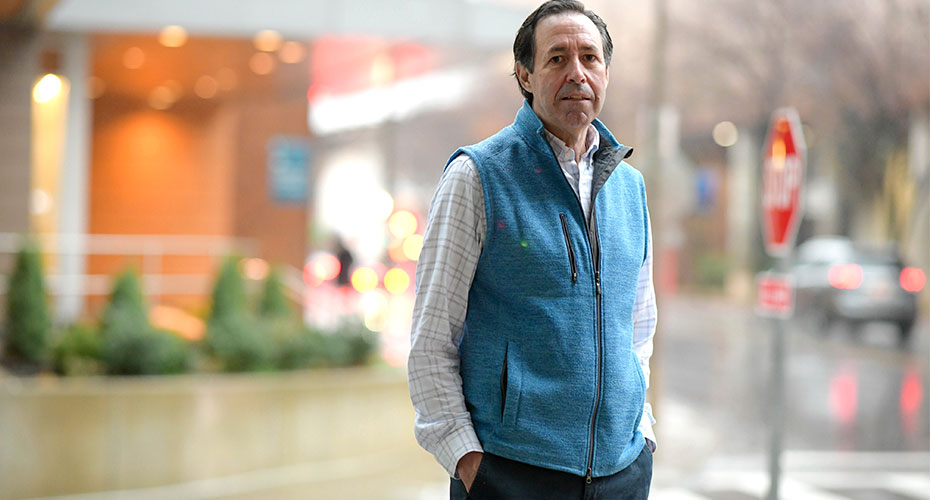Nov 23, 2020
Heroes on the front lines: Rev. John Kearns
At Coverage, we are giving Massachusetts doctors, nurses, chaplains and other hospital workers a chance to speak to you, our readers, in their own words. We asked that they share their simplest, most urgent lessons and messages, as they care for COVID-19 patients with ingenuity, compassion and bravery.

We have fewer COVID cases than we did in the spring, but we’re seeing it surge again. One member of the staff, who just joined in October, said recently, “I feel like there's this black cloud hovering over everything.”
I work in thoracic and palliative care. Part of my job has been to comfort families who cannot see their loved ones who are on life support. I work with patients and families, whether their needs are religious or spiritual, whatever helps them find meaning or purpose or comfort. We chaplains participate in family meetings and support people through the deeper conversations about what their hopes and goals are.
Unfortunately, that remote aspect of meetings and communication has entered a new level in hospital care. It’s so sad to see someone dying or so sick or so fragile and they can't be around the people they need. Families really are suffering from it.
The grieving process is so complicated, full of missed opportunities. The thing is, the staff also suffer.
I'll find myself walking through one of the units and stop and say hello to the nurse and end up sitting down and having a much longer conversation. Talking one-on-one to just process the fatigue, the stress, the trauma of what we've all experienced. I see that as an ongoing issue They’re still processing the first surge. That still lingers.
People in the medical world and hospital institutions are all about getting tasks done without really stopping in between and feeling what we just experienced. There isn't necessarily time, either at work or between surges, to really be reflective about what our experiences were and how they've affected us and how we still carry them with us. With the second surge coming, that heightened anxiety keys into what we've already been through. As a staff we gathered recently and talked about the grief. The overwhelming grief. Some people left working in the hospital because it was just too much. You lose colleagues along the way.
It still boggles my mind when someone says they don't believe this is all real, that it's fake. It has been so traumatic being in it when it was hitting us like a tsunami. You try to describe it to people, and they just don't get it. I feel that isolation or separation between those who met it face-to-face and those who question whether it was real or not.
But there is a togetherness at the hospital. Part of my experience has been, you're in a group of people at the hospital who are in this together. All kinds of people, clinicians, nurses, staff.
Then you drive home, sometimes when the roads are empty, you go home alone, and sometimes you just go back to an empty place for fear of spreading COVID. There are these parallel worlds.
In February, we had to move my mom and dad into an assisted living facility. I would drive after work while it was still daylight and stand in a field and wave to them 50 yards away while they stood in the window. It wasn’t until recently that I got to have them over for lunch one afternoon. The isolation is hard for everyone. I have found comfort certainly in prayer, in mindfulness, and Zoom therapy sessions.
Thankfully, I live in a rural setting in Plymouth, where there’s a connection with nature. There's a lot of company nature provides. I remember noticing all the birds and spring coming back – there was a coming to life that was happening, despite all this. There’s a golden pheasant by my house. You wouldn't believe what company he's become. He comes when I call, and I know his call and his footsteps. He is my colorful company. He has been an unexpected gift.
More in the "Heroes on the front line" series:
Dr. Pardis Sabeti
Harvard University geneticist;
infectious disease researcher at the Broad Institute
Labina Shrestha
Operations manager of environmental services
at Brigham and Women’s Hospital
Robert Elloyan
Assistant nurse manager,
medical intensive unit and cardiac care unit, Boston Medical Center
Maggie Beiser
NP, co-supervising Boston Health Care
for the Homeless' isolation tent program
Dr. Narayana Lebaka
Chief of hospital medicine
Baystate Noble Hospital
Chelsea Lawrence
PA - Emergency Department
Beth Israel Deaconess Hospital–Needham
Are you a health care worker who would like to share your thoughts with Coverage? Contact us.
PHOTO OF REV. JOHN KEARNS BY FAITH NINIVAGGI

